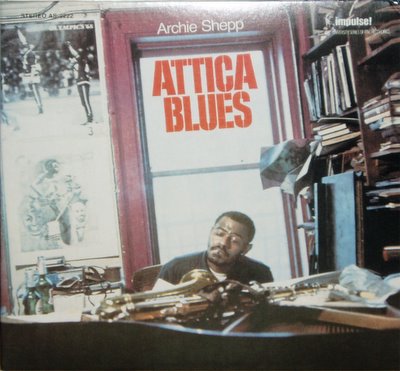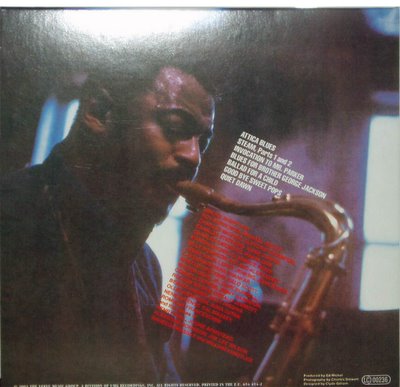

ARCHIE SHEPP
Attica Blues
impulse! AS-9222
Recorded 1972
1. Attica Blues2. Invocation - Attica Blues
3. Steam, pt. 1
4. Invocation to Mr. Parker
5. Steam, pt. 2
6. Blues for Brother George Jackson
7. Invocation - Ballad for a Child
8. Ballad for a Child
9. Goodbye Sweet Pops
10. Quiet Dawn
Collective Personnel
ARCHIE SHEPP; tenor sax, soprano sax
WILLIAM KUNSTLER; narration
BARTHOLOMEW GRAY; narration
WAHEEDA MASSEY; vocal (on 'Quiet Dawn')
JOE LEE WILSON; vocal (on 'Steam')
HENRY HULL; lead vocal (on 'Attica Blues', 'Ballad for a Child')
JOSHIE ARMSTEAD; backup vocal
ALBERTINE ROBINSON; backup vocal
CAL MASSEY; flugelhorn
ROY BURROWES; trumpet
MICHAEL RIDLEY; trumpet
CHARLES McGHEE; trumpet
CLIFFORD THORNTON; cornet
CHARLES STEPHENS; trombone
KIANE ZAWADI; trombone
CHARLES GREENLEE; trombone
HAKIM JAMI; euphonium
MARION BROWN; alto sax, bamboo flute, percussion
CLARENCE WHITE; alto sax
BILLY ROBINSON; tenor sax
ROLAND ALEXANDER; tenor sax
JAMES WARE; baritone sax
LEROY JENKINS; violin
JOHN BLAKE; violin
LAKSHINARAYANA SHANKAR; violin
RONALD LIPSCOLM; cello
CALO SCOTT; cello
JIMMY GARRISSON; bass
WALTER DAVIS JR.; electric piano
CORNELL DUPREE; electric guitar
GERALD JEMMOTT; fender bass
ROLAND WILSON; fender bass
BEAVER HARRIS; drums
OLLIE ANDERSON; percussion
JUMA SATAN; percussion
NENE DeFENSE; percussion
ROMULUS FRANCESCHINI; conductor
‘Attica Blues’ was Shepp’s response to the Attica prison riots of 1971, where over 40 inmates and prison officers were killed when the national guard stormed the jail to put an end to a siege started by the prisoners as an attempt to improve the standards of living in the prison. As a human being, Archie was profoundly angry at this example of man’s inhumanity to man, and set about transforming his rage into recordings that stand today as some of the greatest of his career.
Perhaps in an attempt to get his message heard, but perhaps also as a product of the natural evolution of his sound, ‘Attica’ is further from his free jazz roots than any of his recordings up to 1972. Or at least it seems to be – there are moments of very clever subversion, as we shall see.
First up, though is the title track, one of the triumvirate of great tracks that makes this album special (the others being ‘Steam’ and ‘Blues for Brother George Jackson’). From the off, you can see how far Shepp’s sound has come, as the piece opens with a blast of funky wah-wah guitar before a rousing female vocal takes the roof off. This is the hardest funk in Shepp’s discography, and it’s a killer. The lyric perfectly encapsulates the anger felt at what happened in
‘Steam’, in contrast, is a much mellower affair, sounding at first listen like something straight out of Duke Ellington’s big band. The lyric seems to speak of love, and as the strings tug at the heartstrings, you would be forgiven for thinking this was a commercial ballad. But listen closely, and there is a definite undercurrent of subversion here. Those strings? Do they seem out of tune from time to time? But wait – there’s a pattern here – yes, it’s free jazzery rearing it’s head, but subtly. Also subtle is Shepp’s soprano playing, buried low in the mix beneath the vocalist, but still free. This is, to me, the moment of genius on this album – taking a sentimental ballad and loading it with furtive free jazz references in an attempt to unsettle the mainstream audience. Unfortunately, it’s unlikely that mainstream
The other great piece of music here, ‘Blues for Brother George Jackson’ is a raunchy slice of R&B/funk with a killer horn riff (George Jackson was an influential figure in the Black Panthers, which he joined in prison prior to his death in 1971 - read more here). These players can turn their hands to any musical style, such is the talent on show here. Listened to alone, ‘Blues…’ is incredible, but it rather pales next to the preceding tracks. Allaboutjazz.com declare it to be “one of jazz’s finest moments caught on magnetic tape”, and it is good, just not that good.
Unfortunately, the remainder of the album is forgettable – lots of lush strings and little blowing. ‘Quiet Dawn’ closes the album out with some interesting soul playing, but the vocal of Cal Massey’s 7-year-old daughter Waheeda spoils it somewhat. Mind you, her weak, faltering voice does have a ghostly quality all of it’s own which gives the whole piece an uneasy feel – perhaps this was the intention all along.
Shepp’s next album, ‘The Cry of my People’, takes the whole sentimentality thing even further, but thankfully a lot more successfully than the closing tracks of ‘Attica’, and is another recommended album.


No comments:
Post a Comment